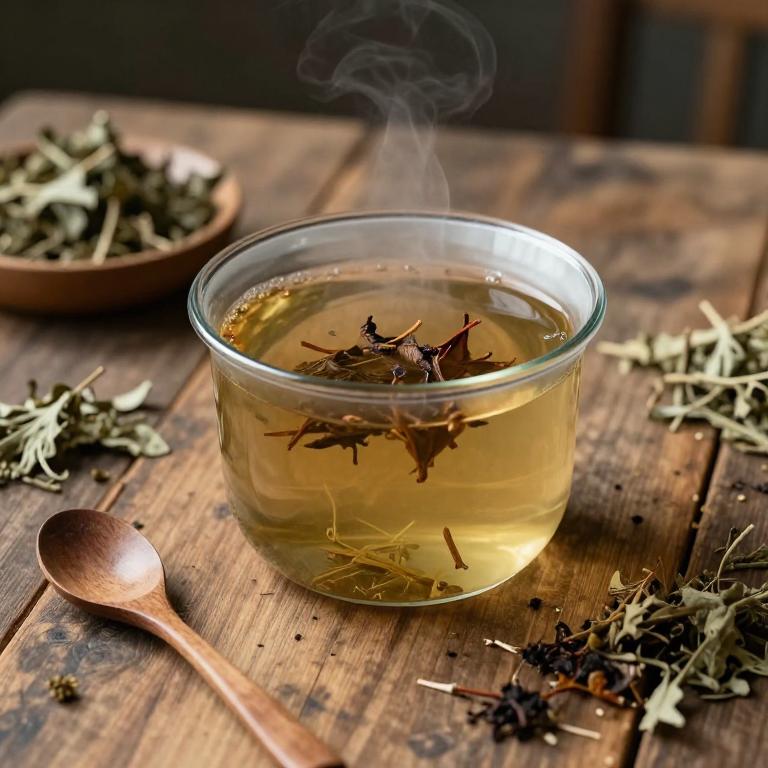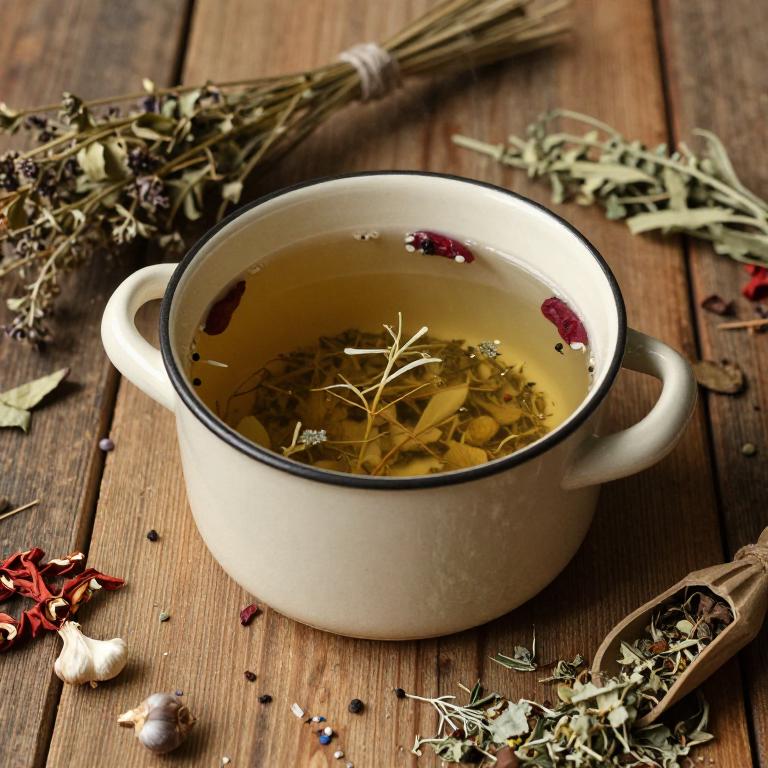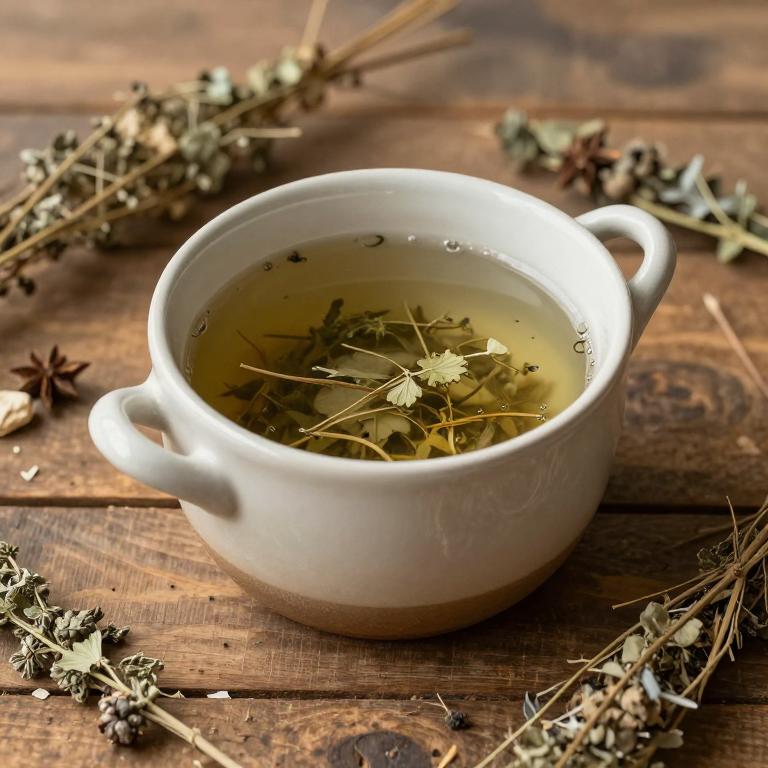10 Best Herbal Decoctions For Rashes

Herbal decoctions have been traditionally used to treat rashes by leveraging the anti-inflammatory and antimicrobial properties of various plants.
Common herbs such as chamomile, calendula, and oatstraw are often brewed into soothing infusions to calm irritated skin. These decoctions can be applied topically as cool compresses or used in bath waters to reduce redness and itching. They are particularly beneficial for mild to moderate rashes caused by allergies, eczema, or insect bites.
However, it is important to consult a healthcare provider before using herbal treatments, especially for persistent or severe skin conditions.
Table of Contents
- 1. Marigold (Calendula officinalis)
- 2. Aloe vera (Aloe barbadensis)
- 3. St. john's wort (Hypericum perforatum)
- 4. German chamomile (Chamomilla recutita)
- 5. English lavender (Lavandula angustifolia)
- 6. Stinging nettle (Urtica dioica)
- 7. Chamomile (Matricaria chamomilla)
- 8. Echinacea (Echinacea purpurea)
- 9. Dog rose (Rosa canina)
- 10. Cancer bush (Sutherlandia frutescens)
1. Marigold (Calendula officinalis)

Calendula officinalis, commonly known as pot marigold, has been traditionally used in herbal medicine for its soothing and anti-inflammatory properties.
Herbal decoctions made from dried calendula flowers are often prepared by simmering the petals in water for several minutes, creating a gentle infusion that can be applied topically. These decoctions are particularly effective for treating mild to moderate skin rashes, eczema, and other inflammatory skin conditions due to their high content of flavonoids and triterpenes. The anti-microbial and wound-healing properties of calendula help reduce redness, irritation, and promote skin regeneration.
When used as a topical remedy, calendula decoctions offer a natural and accessible alternative for those seeking to alleviate rash-related discomfort without harsh chemical ingredients.
2. Aloe vera (Aloe barbadensis)

Aloe barbadensis, commonly known as aloe vera, has been widely used for its soothing properties in treating rashes and skin irritations.
The gel extracted from the inner leaf of the aloe plant contains various bioactive compounds, including polysaccharides, enzymes, and antioxidants, which contribute to its healing effects. When prepared as a herbal decoction, aloe barbadensis can help reduce inflammation, promote skin regeneration, and alleviate redness associated with rashes. This traditional remedy is often applied topically, though some formulations may be consumed internally under medical guidance.
Due to its natural antiseptic and anti-inflammatory properties, aloe barbadensis decoctions are considered a gentle and effective option for managing mild to moderate skin irritations.
3. St. john's wort (Hypericum perforatum)

Hypericum perforatum, commonly known as St. John's Wort, is traditionally used in herbal medicine for its anti-inflammatory and antiseptic properties.
When prepared as a herbal decoction, it can be applied topically to soothe and heal various types of skin rashes, including eczema and contact dermatitis. The active compounds in hypericum, such as hypericin and flavonoids, help reduce redness, itching, and irritation associated with these conditions. To prepare the decoction, dried hypericum leaves and flowers are simmered in water for several minutes, then strained and cooled before application.
While generally safe for topical use, it is important to consult a healthcare professional before using hypericum perforatum, especially if there are underlying health conditions or if other medications are being taken.
4. German chamomile (Chamomilla recutita)

Chamomilla recutita, commonly known as German chamomile, has been traditionally used for its calming and anti-inflammatory properties, making it a popular choice for herbal decoctions aimed at treating rashes.
When prepared as a decoction, the essential oils and active compounds such as bisabolol and chamazulene are extracted, providing soothing effects on irritated skin. This herbal remedy is often recommended for mild skin irritations, eczema, and insect bites due to its ability to reduce redness and itching. The decoction can be applied topically as a compress or used in bath infusions to promote healing and relief.
However, individuals with allergies to plants in the daisy family should exercise caution, as chamomile may trigger adverse reactions in some cases.
5. English lavender (Lavandula angustifolia)

Lavandula angustifolia, commonly known as English lavender, has been widely used in herbal medicine for its soothing and anti-inflammatory properties.
Herbal decoctions made from lavender are often prepared by simmering the dried flowers in water to extract their beneficial compounds, such as linalool and linalyl acetate. These decoctions can be applied topically to soothe skin rashes, reduce redness, and provide a calming effect due to their antimicrobial and antiseptic qualities. The aromatic compounds in lavender also help alleviate itching and promote a sense of relaxation, making it a popular remedy for various skin irritations.
However, it is important to consult a healthcare professional before using lavender decoctions, especially for severe or persistent rashes.
6. Stinging nettle (Urtica dioica)

Urtica dioica, commonly known as stinging nettle, has been traditionally used in herbal medicine to address various skin conditions, including rashes.
Its leaves and stems contain compounds such as histamine, acetylcholine, and formic acid, which can cause a stinging sensation when touched, but also have therapeutic properties when prepared as a decoction. A herbal decoction of Urtica dioica is typically made by simmering the dried leaves in water for several minutes to extract its beneficial compounds. This preparation is often used topically to soothe inflamed or irritated skin, reduce itching, and promote healing.
However, it is important to consult a healthcare professional before using stinging nettle decoctions, as they may interact with certain medications or cause allergic reactions in some individuals.
7. Chamomile (Matricaria chamomilla)

Matricaria chamomilla, commonly known as chamomile, has been traditionally used for its soothing properties, and its herbal decoctions are often employed to alleviate skin rashes.
The active compounds in chamomile, such as bisabolol and flavonoids, possess anti-inflammatory and antiseptic qualities that can help reduce redness, itching, and irritation associated with rashes. A chamomile decoction can be prepared by steeping the dried flowers in hot water, creating a calming infusion that can be applied topically to the affected area. This natural remedy is particularly beneficial for mild skin irritations, eczema, or insect bites, offering a gentle alternative to conventional treatments.
However, individuals with allergies to plants in the Asteraceae family should exercise caution, as chamomile may trigger adverse reactions in some cases.
8. Echinacea (Echinacea purpurea)

Echinacea purpurea, commonly known as purple coneflower, is a popular herbal remedy often used to support the immune system and alleviate symptoms of minor skin irritations.
Herbal decoctions made from Echinacea purpurea can be prepared by simmering the dried roots, leaves, and flowers in water to extract their active compounds. These decoctions are sometimes used topically to reduce inflammation and soothe rashes caused by eczema, insect bites, or other skin conditions. However, it is important to note that while some people find relief with echinacea, scientific evidence supporting its effectiveness for rashes is limited.
As with any herbal remedy, it is advisable to consult a healthcare professional before use, especially for individuals with known allergies or underlying health conditions.
9. Dog rose (Rosa canina)

Rosa canina, commonly known as dog rose, has been traditionally used in herbal medicine for its anti-inflammatory and soothing properties.
Herbal decoctions made from Rosa canina fruits and leaves are often prepared by simmering the dried parts in water to extract their beneficial compounds. These decoctions are believed to help alleviate symptoms of various skin rashes due to their high content of vitamin C, flavonoids, and other antioxidants. The anti-itch and antimicrobial properties of Rosa canina may provide relief from irritation and prevent secondary infections in rash-prone skin.
While generally considered safe, it is advisable to consult a healthcare professional before using Rosa canina decoctions, especially for severe or persistent rashes.
10. Cancer bush (Sutherlandia frutescens)

Sutherlandia frutescens, also known as cancer bush, is a traditional South African plant that has been used in herbal medicine for various ailments, including skin conditions.
Herbal decoctions made from the plant are believed to possess anti-inflammatory and antiseptic properties, which may help in the treatment of rashes. These decoctions are typically prepared by boiling the dried roots or leaves in water, allowing the active compounds to infuse into the liquid. Some studies suggest that the plant's compounds may support the body's natural healing processes and reduce skin irritation.
However, more scientific research is needed to fully understand its efficacy and safety for treating rashes.